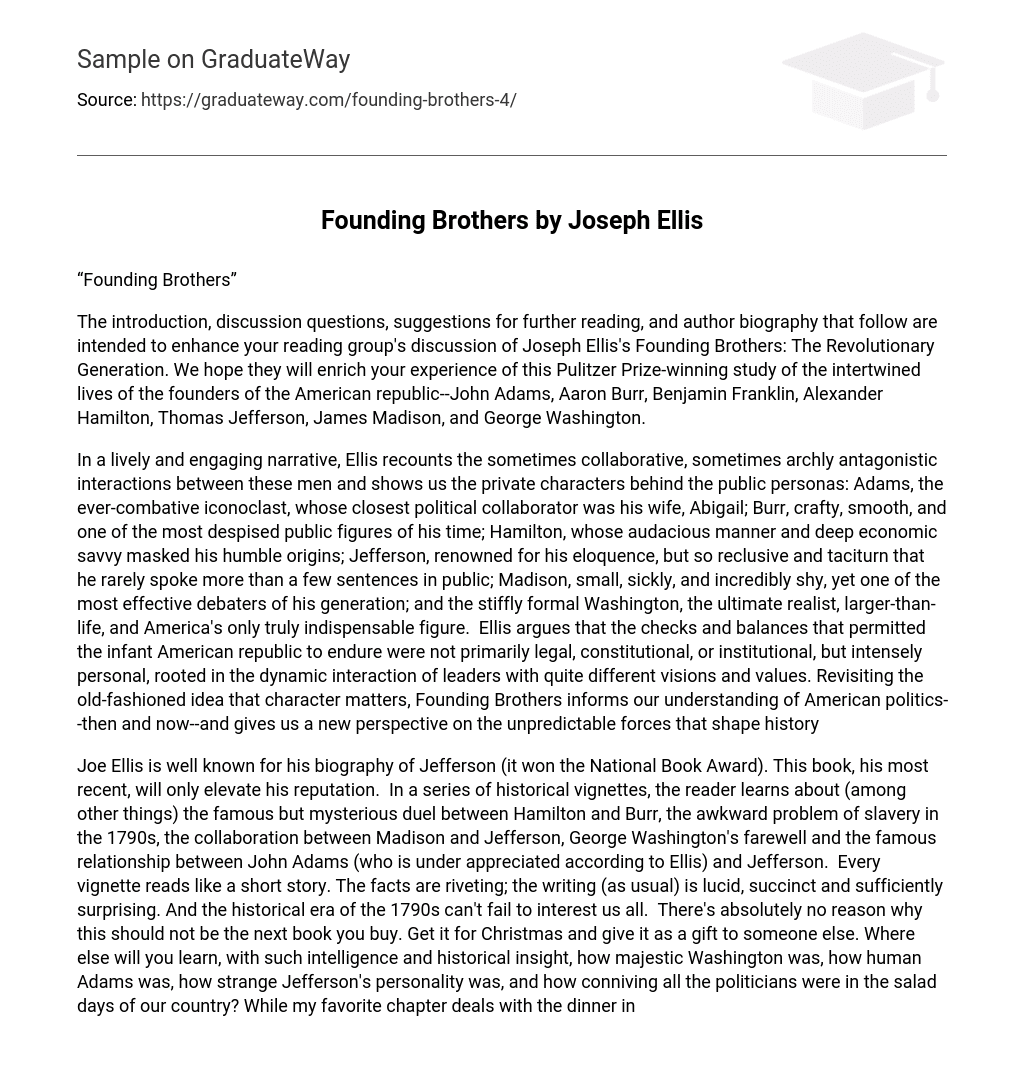“Founding Brothers”
The introduction, discussion questions, suggestions for further reading, and author biography that follow are intended to enhance your reading group’s discussion of Joseph Ellis’s Founding Brothers: The Revolutionary Generation. We hope they will enrich your experience of this Pulitzer Prize-winning study of the intertwined lives of the founders of the American republic–John Adams, Aaron Burr, Benjamin Franklin, Alexander Hamilton, Thomas Jefferson, James Madison, and George Washington.
In a lively and engaging narrative, Ellis recounts the sometimes collaborative, sometimes archly antagonistic interactions between these men and shows us the private characters behind the public personas: Adams, the ever-combative iconoclast, whose closest political collaborator was his wife, Abigail; Burr, crafty, smooth, and one of the most despised public figures of his time; Hamilton, whose audacious manner and deep economic savvy masked his humble origins; Jefferson, renowned for his eloquence, but so reclusive and taciturn that he rarely spoke more than a few sentences in public; Madison, small, sickly, and incredibly shy, yet one of the most effective debaters of his generation; and the stiffly formal Washington, the ultimate realist, larger-than-life, and America’s only truly indispensable figure. Ellis argues that the checks and balances that permitted the infant American republic to endure were not primarily legal, constitutional, or institutional, but intensely personal, rooted in the dynamic interaction of leaders with quite different visions and values. Revisiting the old-fashioned idea that character matters, Founding Brothers informs our understanding of American politics–then and now–and gives us a new perspective on the unpredictable forces that shape history
Joe Ellis is well known for his biography of Jefferson (it won the National Book Award). This book, his most recent, will only elevate his reputation. In a series of historical vignettes, the reader learns about (among other things) the famous but mysterious duel between Hamilton and Burr, the awkward problem of slavery in the 1790s, the collaboration between Madison and Jefferson, George Washington’s farewell and the famous relationship between John Adams (who is under appreciated according to Ellis) and Jefferson. Every vignette reads like a short story. The facts are riveting; the writing (as usual) is lucid, succinct and sufficiently surprising. And the historical era of the 1790s can’t fail to interest us all. There’s absolutely no reason why this should not be the next book you buy. Get it for Christmas and give it as a gift to someone else. Where else will you learn, with such intelligence and historical insight, how majestic Washington was, how human Adams was, how strange Jefferson’s personality was, and how conniving all the politicians were in the salad days of our country? While my favorite chapter deals with the dinner involving Hamilton, Jefferson and Madison. In which the federal government assumed the national debt from the states, for the relocating of the federal government, on the Potomac River. Jefferson and Madison also made sure that, unlike Great Britain or France, the national capital would not be the financial center of the country.
Among the other informative points that Ellis brings up was that Hamilton was the only prominent American casualty of the ideological differences stemming from the decades after the American Revolution. The growing unpopularity of Washington’s second administration with other prominent Virginians which culminated with his Farewell Address was also interesting.
Founding Brothers is an exceptionally easy and quick book to read. Ellis repeatedly informs us what the world was like in the 1790’s, when there was little historical precedence for a republican style of government or a biracial society. There were many labyrinthine agreements made between the founding brothers and Ellis’ research is highly commendable in attempting to sort it all out. For anyone interested in the years that followed the ratification of the Constitution and the beginnings of our present day government, this book is a must.
Ellis has said of Founding Brothers, “If there is a method to my madness in the book, it is rooted in the belief that readers prefer to get their history through stories. Each chapter is a self-contained story about a propitious moment when big things got decided. . . . In a sense, I have formed this founding generation into a kind of repertory company, then put them into dramatic scenes which, taken together, allow us to witness that historic production called the founding of the United States.” Does his focus on creating separate narrative units succeed in making the complex history of the founders simpler to penetrate and understand? Are there any drawbacks to presenting history this way? In the conflict between Republicans and Federalists described by Ellis throughout the book, readers can understand the origins of party factionalism that is a strong factor in American politics to this day. If, as Ellis writes, “The dominant intellectual legacy of the Revolution, enshrined in the Declaration of Indepen-dence, stigmatized all concentrated political power and even . . . depicted any energetic expression of governmental authority as an alien force that all responsible citizens ought to repudiate and, if possible, overthrow” [1], what compromises were made in order to bring a stable national government to fruition? Does the apparent contradiction between Republican and Federalist principles still create instability in the American system?
In recent years historians have tended to avoid focusing on such issues as leadership and character, and more is being written about popular movements and working people whose lives exemplify a sort of democratic norm. Ellis clearly goes against this trend in offering Founding Brothers as “a polite argument against the scholarly grain” [2]. Does he effectively convince his readers that the founding of the American nation was, in fact, largely accomplished by a handful of extraordinary individuals? What does Ellis mean when he says that the public figures on which he focuses in this book were “America’s first and, in many respects, its only natural aristocracy”. [3]
Works Cited.
FOUNDING BROTHERS by Joseph Ellis, p/11
FOUNDING BROTHERS by Joseph Ellis, p/12
FOUNDING BROTHERS by Joseph Ellis, p/13





